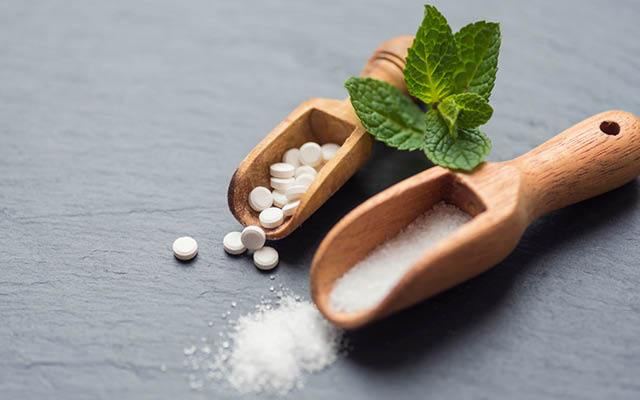Whenever Terry Choszczyk drank a diet soda, it seemed to require a chaser of something else that was sweet — the piece of chocolate cake she’d been craving, a handful of cookies. Anything sweet.
“I was always hungry,” recalls the 46-year-old medical insurance biller from Ansonia, Conn. “The diet sodas didn’t curb my appetite, but I thought that since they had no calories, it was OK for me to have something else.”
She was drinking about six cans of diet soda every day, along with other artificially sweetened drinks and products. All those sugary snacks paired with the diet drinks made her weight soar. Plus, she was tired and suffered from frequent headaches.
When she finally sought some answers at the Integrative Medicine Center at Griffin Hospital in nearby Derby, one of the first things physicians told her was to lay off the artificially sweetened products and aim for a healthy diet that didn’t replace calories with chemicals.
Two years later and 40 pounds lighter, Choszczyk says she now craves fruits and vegetables — and can’t even tolerate the taste of diet soda.
For years, doctors and researchers have observed that people who use low-calorie sugar-and-fat replacements to try to control their weight don’t seem to have much success. If anything, the people toting giant bottles of diet soda seem to carry their excess pounds more stubbornly. The findings from a number of studies support that observation. Low-calorie food replacements don’t seem to help users reach the point of comfortable fullness, or satiety, which is key to moderate eating. In fact, some studies have suggested that, rather than supporting weight loss, the use of artificial sweeteners and fats may lead to overeating and weight gain.
Too Sweet for Our Own Good
“Sweet is addictive,” says David Katz, MD, MPH, director of the Yale-Griffin Prevention Research Center and coauthor of Dr. David Katz’s Flavor-Full Diet. “The sweeter your diet, the more you want sweet. The more sweet you get, the more you need to feel satisfied.”
The artificial sweeteners on the market now are between 300 and 1,200 times as sweet as sugar, Katz notes. “Whatever sugar does to reinforce a sweet tooth, artificial sweeteners do even more potently.”
Researchers at the Ingestive Behavior Research Center at Purdue University have been testing the connection between low-calorie food replacements and weight gain in an effort to explain the dramatic increase in the number of overweight and obese Americans over the last 30 years. They suspect the trend is due to a variety of environmental factors, including the increasing pervasiveness of artificial fats and sweeteners.
In a July 2004 study published in the International Journal of Obesity, the Purdue researchers found that rats who were raised with access to both sugared and artificially sweetened liquids ate more of their regular food than rats provided sugared liquids only. The researchers concluded that the artificial sweeteners somehow disrupt the body’s ability to discern how many calories it’s consuming — a process that’s critical for maintaining a healthy body weight. The researchers conducted a similar study using low-calorie fat replacements and obtained the same results.
“It’s reasonable to assume that by consuming these substances, people might lose one of the automatic or unconscious mechanisms we have for regulating food intake and body weight,” says Susan Swithers, PhD, associate professor of psychological sciences at Purdue and one of the study’s authors. “That might force people to use more-conscious mechanisms — like counting calories or exercising — or rely on willpower in a way that they wouldn’t if they had these more automatic processes.”
The Diet Soda Paradox
Researchers at the University of Texas Health Science Center at San Antonio were surprised to see the same kind of dietary paradox turn up in their data, too — and they weren’t even looking for it. They had enrolled 5,158 people in the San Antonio Heart Study to evaluate a wide range of health and lifestyle issues — including diet and obesity — that might be connected to cardiovascular risks.
After the participants’ seven-year follow-up, public health specialist Sharon Fowler, MPH, was expecting to see a correlation between sugar-sweetened drinks and weight gain. She was astounded to find that those who drank diet soda were more likely to gain weight than those who drank regular soda.
“I was so concerned that there must be a problem with our data that I set this aside for a few years,” Fowler says. “When we finally reexamined the data, we found that there was actually a dose-response relationship between diet-soda consumption and the future risk of becoming overweight or obese.” That means the more diet soda people drank at the beginning of the study, the greater their tendency to become overweight or obese over the next seven years.
Fowler has since studied the literature on low-calorie food replacements and is still trying to determine why diet-soda use seems to be associated with weight gain in this study. One possible explanation: People who consume diet sodas might believe that the calories they “save” give them leeway to eat extra amounts of high-calorie foods with impunity.
Fowler points to a study in which subjects given full-calorie test foods were told they were low-calorie products. These experimental subjects ate more total calories throughout the rest of the day than the control subjects given the same foods, but told that they were full-calorie.
“It’s possible that people overshoot and eat more food than they need to make up for the calories that they save through using diet products,” Fowler says. “So if a person has a diet soda and feels entitled to an extra slice of pizza, it may be that only half a slice of the pizza has the same number of calories he or she ‘saved’ through drinking diet rather than regular soda, but the person gave him or herself permission for the full slice, thinking that it was OK.”
Fowler is also interested in something called the “cephalic phase insulin response,” in which the human body prepares for incoming calories even before a forkful of food or a sip of liquid enters the mouth — increasing its production of insulin, for example, in preparation for a regular soda. She questions whether the body might also produce insulin (which turns glucose into energy) for an incoming diet soda, even when the person knows that it contains no sugar. Studies on this point have yielded mixed results. But if the body does produce insulin for diet soda, what happens to all that insulin when there’s no glucose to act upon?
People have long questioned the safety of low-calorie food replacements, although studies haven’t turned up the definitive smoking gun for cancer or other major concerns. Still, some researchers remain skeptical. Nutritionist Joan Gussow, EdD, author of This Organic Life: Confessions of a Suburban Homesteader, says study results can be misleading — especially if the manufacturer of the substance under scrutiny funds the research.
And nutritional studies usually are not conducted long enough to accurately detect the cumulative impact of ingesting low-calorie food replacements over the course of many decades. Most nutritional studies are brief, simply because most funding agencies and researchers can’t afford to keep them going.
“We often don’t have the opportunity to observe and study someone for 15 years under a research grant,” says Param Dedhia, MD, a faculty doctor at Johns Hopkins University in Baltimore, Md. “Most research careers and funding opportunities do not offer long-term study. Unfortunately, when you study something like nutrition, the effects might not happen in 30 days or one year.” (For more on evaluating nutritional diet studies, see “A Study in Confusion.”)
Chemicals vs. Food
However unclear the impact of low-calorie food replacements on our overall health, one thing is certain: There is scant proof that they do the one thing we expect of them — to help us lose weight. But that hasn’t curbed our devotion to them. An estimated 180 million Americans used these products in 2004, up from 78 million two decades earlier.
According to some estimates, the market for artificial sweeteners alone has increased — and will continue to increase — by about 8.3 percent per year through 2008.
“If you can make and sell the stuff and profit handsomely, why wouldn’t you?” says Yale-Griffin’s Katz. “The manufacturers are not obligated to show that artificial sweeteners help with weight control. But if you say ‘no calories,’ it sounds an awful lot like this will help you slim down.”
Even more worrisome, say Katz and others, is the growing suspicion that Americans believe eating chemicals is as good as eating food. These experts suggest that many of us now suffer from what Gussow and others call a “national eating disorder”: We’re afraid of being fat, and we’ve become convinced that we’re incapable of curbing our appetites, so we allow ourselves to fill up on dubious chemicals that have no resemblance to real food. (For more on the “disorder” argument, see “Raise Your Food Consciousness.”)
Gussow sat on the Food and Drug Administration’s food advisory committee when Proctor and Gamble sought approval for its ill-fated fat substitute, Olestra, which the company was forced to admit caused an unpleasant side effect called “anal leakage.” She believes people would be inclined to laugh such products out of the marketplace if they weren’t so confused and alarmed by food-related messages they’ve been getting. “These [diet-food marketing ploys] are desperate attempts to make money [by] making people crazy about their food,” Gussow asserts.
What we really need to know is this, she says: Successful long-term weight loss usually involves getting people more engaged with their food — real food — by selecting it, cooking it, enjoying it and learning to sense when they’ve had enough. More often than not, low-calorie foods don’t support that conscious relationship. They confuse it.
The No-Calorie Fallacy
The human body evolved to eat real, natural foods — not polysyllabic chemicals engineered to imitate food. When we attempt to satisfy our desire for sugar or fat with “no calorie” foods that are loaded with these chemicals, experts say, we’re really just disturbing the natural mechanisms our bodies have developed to keep us healthy.
“The body runs on calories,” says Kathie Swift, MS, RD, nutrition director of the UltraWellness Center in Lenox, Mass. “The no-calorie approach just doesn’t make physiological sense.” What does make sense, Swift and others say, is to focus on the quality of the food we’re eating and to make sure these foods are as close to nature as possible. When you’re famished, instead of reaching for some no-calorie or no-fat concoction with a shelf life of 27 years, go for snacks like nuts or fruit that will actually satisfy your hunger and support your energetic needs.
Swift works with her patients to help them avoid cravings for sugar or fat that can overwhelm their intentions to eat well. She helps them pay attention to the hunger sensation, which helps them distinguish between actual physical hunger and the desire to eat that can arise from stress or other psychological pressures. She teaches them to develop ways to soothe these pseudo-hungers, such as listening to music or breathing deeply. She coaches them to establish a steady pattern of eating, so they don’t become overly hungry and reach for the first candy bar in sight. And she encourages patients to be aware of the kind of “mindless eating” discussed in Brian Wansink’s book of the same title, Mindless Eating: Why We Eat More Than We Think.
“We need to be aware that we’re living in a 24/7 environment of food availability,” Swift says. “There’s even a food emporium at just about every gas station in America, and sometimes just the sights and smells of food can override our true hunger. But with greater awareness, we can avoid this ‘see food, eat food’ response.” Eating real food with consciousness and health-motivated intent, she says, beats the simplistic calorie-avoidance strategy every time.
This article has been updated and originally appeared as “Poor Substitutes” in the December 2007 issue of Experience Life.




This Post Has 0 Comments